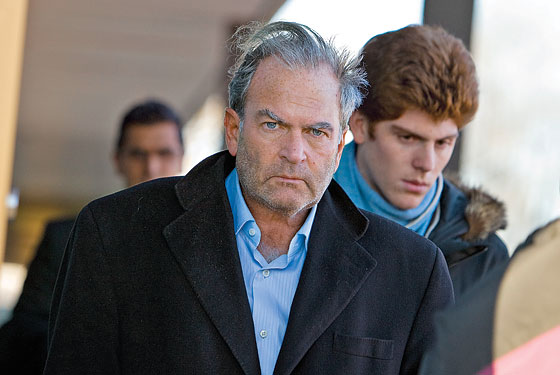Like Bernie Madoff, Marc Dreier bilked unsuspecting investors out of many millions of dollars. But Dreier did it with flair.
By Robert Kolker
 |
| Dreier after being released on bail, in December. (Photo: Newscom) |
There was a time when Marc Dreier thought he could talk his way out of anything. But by last fall, even he was scrambling. Whenever the stylish, hyperaggressive 58-year-old white-collar litigator turned around, clients and colleagues at Dreier LLP, the marquee Park Avenue firm he'd built from almost nothing to 250 lawyers in just five years, were asking questions—about back rent, unpaid loans, depleted client escrow funds, documents of uncertain provenance. What Dreier needed to make these questions go away, he knew, was money. About $40 million, for starters.
On Tuesday, December 2, Dreier boarded a private jet and flew to Toronto. When he landed, a driver brought him to the financial district and pulled up to the stout, glass-encased Xerox Tower. Dreier climbed out of the car and walked into the building. He was expensively dressed, but short and perma-tanned, with a thatch of gray hair swept over a sizable bald spot. He rode the elevator to the third-floor offices of the $100 billion Ontario Teachers' Pension Plan, one of the largest retirement funds in Canada. Dreier had arranged a meeting with one of the plan's in-house lawyers, Michael Padfield, ostensibly to discuss business opportunities. But Dreier had other motives, and the meeting lasted only briefly. Before saying good-bye, Dreier asked for a place to wait until his plane was ready. He was sure to take Padfield's business card.
Dreier dropped his things in a conference room, then went to the lobby, where he paced for an hour and eyed the entrance, until he spotted Howard Steinberg, an executive with a $34 billion New York hedge fund named Fortress. Steinberg and Dreier had never met, but they had been in touch earlier, when Steinberg had been trying to confirm the authenticity of some documents Dreier had sent him, promissory notes said to be worth $44.7 million that Dreier was offering to sell to Steinberg. When Dreier had told Steinberg the notes were guaranteed by the Ontario Teachers' Pension Plan, Steinberg had asked to meet with someone from the fund personally. Dreier told Steinberg he'd arrange a meeting with Michael Padfield.
Dreier worked Padfield's business card into Steinberg's hand. Upstairs in the conference room, Dreier showed Steinberg some papers signed in Padfield's name. But the meeting didn't go as planned; Steinberg sensed something was off, and Dreier ended the meeting abruptly and went straight for the elevator. When he was gone, Steinberg approached the receptionist and asked her a simple question.
"Was that Michael Padfield?"
"No," said the receptionist, "it wasn't."








No comments:
Post a Comment